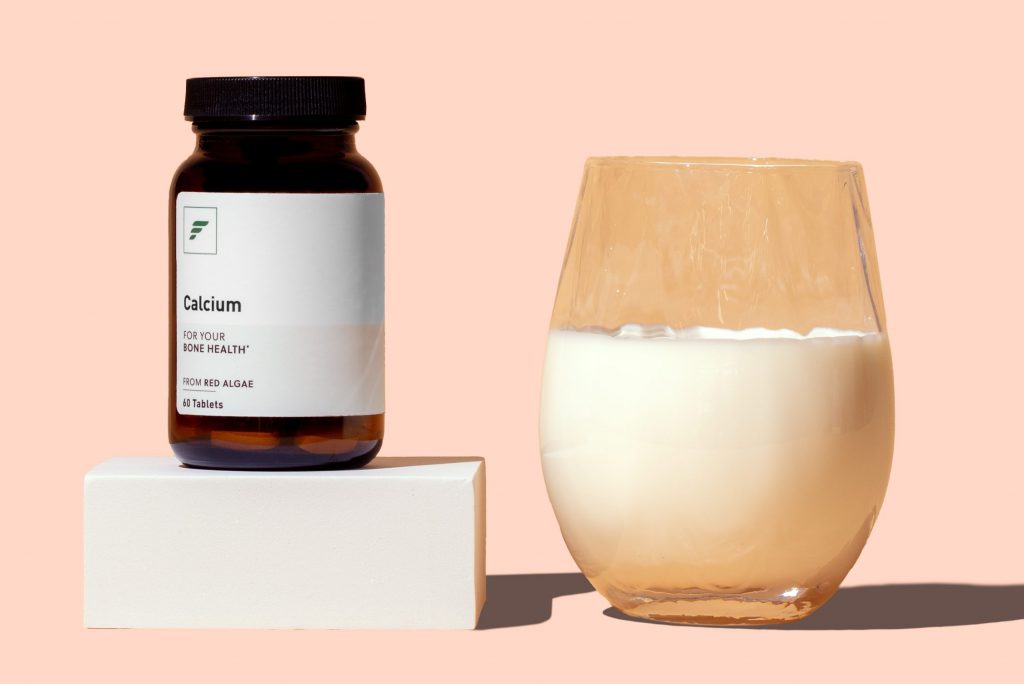Calcium

Why do we need calcium?
Calcium is a mineral that the body needs for numerous functions. Calcium is primarily required to help the body build strong bones when we’re young and to keep our bones strong as we age. In addition to good bone health, calcium is also involved with the regulation of our heart’s rhythm, the transmission of nerve impulses and the clotting of the blood.
About 99% of the calcium in our body can be found in our bones and teeth, only 1% is found in the blood serum. Serum calcium levels are always steady and don’t fluctuate due to a very quick response mechanism in our body. When serum calcium levels drop, the body will transfer calcium from our bones (1).
People with a calcium deficiency are often not aware of this as it does not lead to obvious symptoms in the short term. As explained previously, serum calcium is tightly regulated, so when the dietary calcium intake is low, the body will take calcium from the bones to bring it back to an acceptable level. The very first symptom of calcium deficiency can sometimes be an unexpected bone fracture or loss of a tooth.
As we age, we absorb less and less calcium from our diet, causing our bodies to take more and more calcium from our bones. This can eventually lead to osteomalacia (softening of the bones) or osteoporosis (fragile and weak bones) in later life. If calcium deficiency continues over a long time you can have permanent loss of bone that can result in fragility, broken bones, loss of mobility and more! Postmenopausal women have a higher risk of developing osteoporosis because of declining oestrogen concentrations associated with menopause (2).
Food sources of calcium.
- Dairy products (milk, yoghurt, cheese)
- Green leafy vegetables (spinach, kale, broccoli, cabbage)
- Fortified products such as orange juice, plant-based milks and cereal
- Canned sardines or salmon
- Soy products (tofu and tempeh)
- Oats
- Pulses
- Sesame seeds
- Dried fruits (raisins, prunes, figs, apricots)
What is the Nutrient Reference Value of calcium?
800 mg per day for adults (3).
To be able to absorb calcium, the body needs vitamin D to form calcitriol. Calcitriol is a hormone that promotes the absorption of dietary calcium from the gastrointestinal tract (1). For this reason, it’s important that your vitamin D levels meet your needs as well before you opt to take a calcium supplement.
FFF Supplement Dose.
200 mg calcium and 7.3 mg magnesium in one tablet.
Suggested intake: 1-2 tablets.
For who do we recommend a supplement?
Most people who include dairy products in their diet will obtain a sufficient amount of daily calcium. However, certain groups like people on a vegan diet, people with a lactose intolerance, or postmenopausal women could have trouble getting enough calcium from their diet and a supplement might help.
Why choose supplements from Fresh Fitness Food?
We’ve chosen a natural mineral source of calcium coming from calcareous marine algae (Lithothamnion sp.). The seaweed is sustainably sourced from the North Atlantic seabed.
Studies have shown that this natural form of algae-sourced calcium improves bone mineral density and strength better compared to synthetic calcium (4). A smaller study observed greater activity for certain bone growth markers in premenopausal women with the supplementation of algae-derived calcium compared to calcium carbonate or a placebo (5).
Other studies have also found a reduction in symptoms and improved the range of motion and walking distances for people with osteoarthritis when a natural algae mineral is taken as a supplement (6, 7, 8).
When it comes to our health, the food we put in our bodies can have a significant impact in many ways. It affects our mood, energy levels, stress, physical activity and everything in between. The right nutrition can help us to feel better, every day. At Fresh Fitness Food we believe in a food-first approach as food provides you with so much more than just nutrients. Many of us should be able to get most nutrients from a healthy and balanced diet, however, there are some caveats and exceptions where food supplements can assist to fill up the gaps.
Maintaining strong bones and supporting key bodily functions starts with getting enough calcium in your diet. From dairy products and leafy greens to fortified foods and seeds, there are plenty of natural sources of calcium to choose from. However, for those with dietary restrictions or higher needs, supplementing with calcium rich foods or natural supplements can make a big difference. We make this easier with healthy meal delivery options designed to support your nutrition and wellbeing, every day.